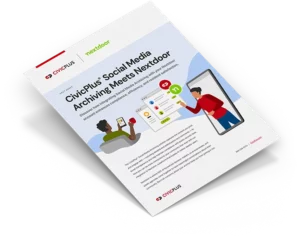7 Benefits of Nextdoor as Part of a Local Government Communication Plan
You already know that social media is an effective way to connect with digitally-minded citizens on a regular basis. You’re likely already using Facebook, X (formerly Twitter), and LinkedIn to keep citizens informed and share information on local events and opportunities, but you may be missing out on an opportunity to connect with individual residents and neighborhoods in even more engaging ways. Nextdoor is a social media site with a mission that is well-aligned with that of local government, making it an ideal, though often underutilized, local government communication tool. If your community is looking for a platform that can stimulate dialogue about hyperlocal development, safety, community resources, and events, it’s time to learn about the value of Nextdoor.
Nextdoor: The Private Social Network for Neighborhoods
Nextdoor positions itself as “the private social network for your neighborhood.” It offers benefits to both municipalities and their residents. For local governments, it allows public agencies to create profiles to connect with local neighborhoods, take part in two-way dialogue, and maintain visibility into the issues that matter most to residents. For citizens, it allows neighbors to connect with one another, share information, find local community resources such as babysitters, and alert one another to events of concern, such as a streak of nearby break-ins.
Fact Sheet
Our Social Media Archiving Software Now Integrates with Nextdoor
Discover how integrating Social Media Archiving with your Nextdoor account enhances compliance, efficiency, and resident satisfaction.
If you’re wondering if the implementation of another social media tool is a worthwhile investment for your staff, consider the following seven benefits of creating a Nextdoor profile for your community:
Seven Benefits of Nextdoor for Local Governments
1. Direct Access to Receptive Citizen Listeners
Nextdoor allows for direct reach to known residents in your community that want to connect with their neighbors, community members, and local leaders. It’s a platform to encourage civic participation in town hall meetings, volunteer events, and recreation activities, that feels more like a personal invitation than a general social media advertisement.
2. Hyperlocal Messaging
Nextdoor allows local governments to craft targeted messaging at the neighborhood level. For example, if your administration is about to begin a construction project that may disrupt a specific neighborhood or community, you can target those residents specifically to show them that you are concerned about their needs and are making an effort to reach them directly.
3.Message Segmenting
Not only does Nextdoor allow for targeted messaging, it provides for the ability to segment messages to one or several neighborhoods or service areas.
4. Connecting Citizens to Local Representatives
With Nextdoor, public servants such as police officers and government representatives are able to more closely and directly connect with citizens in meaningful ways. For voters to see that their local representative actively participates in hyperlocal community discussions validates that their public servants are paying attention to their needs and taking an active role in community improvements.
5. Access to the Voters’ Voices
Nextdoor provides the ability to engage in two-way dialogue with residents to announce information, solicit public opinion, and act on issues of interest to the community in an informal, but direct and impactful manner. It allows you to solicit feedback on hyperlocal topics while demonstrating to citizens and residents that you value their input.
6. Crime Prevention Resources
One of the greatest advantages of Nextdoor is its ability to act as a digital neighborhood crime prevention watch tool. Your local government can use Nextdoor to issue proactive crime prevention advice to residents to help keep their families and properties safe. At the same time, residents can report suspicious activity that they observe, allowing your local police or sheriff’s department to remain engaged in the community’s crime prevention efforts.
7. Citizen Engagement
Most importantly by becoming part of a community or neighborhood’s hyperlocal dialogue, you reinforce to your citizens that you care about their needs and are taking an active role in understanding what they need to lead better, more satisfying lives for themselves and their families.
For more information, tips, and advice on other social media platforms that can be leveraged as part of a comprehensive citizen engagement plan click here to download our Ultimate Local Government Social Media eBook.



